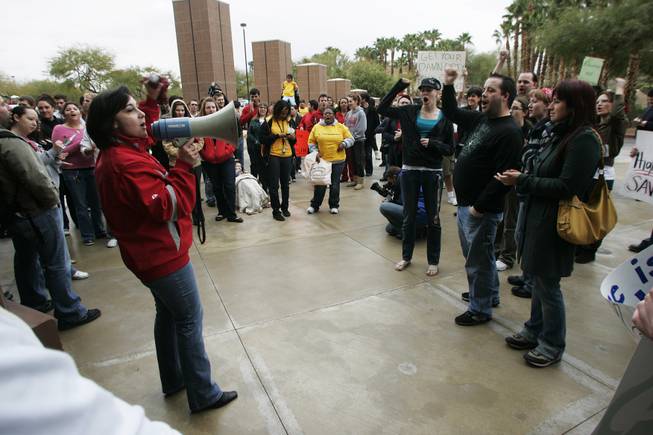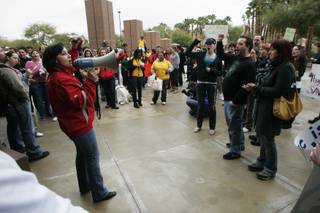Wednesday, Feb. 10, 2010 | 2 a.m.
Raw video of rally
State of the State
Gov. Jim Gibbons gave an emergency State of the State address at 6 p.m. Monday, Feb. 8. Video is courtesy KVBC Channel 3.
Related Stories
- Hundreds rally to protest governor’s proposed budget cuts (2-9-2010)
- Governor sounds like the GOP candidate he is, observers say (2-9-2010)
- The bleeding of education: Gibbons faults ‘whining’ about school funding (2-9-2010)
- Cuts would dramatically shrink Nevada safety net (2-9-2010)
- Gibbons: No battle expected over taxes during special session (2-8-2010)
- Governor plans emergency address on Nevada budget (2-7-10)
- Governor’s speech will lay out state’s budget problems (2-7-10)
- State budget comes up $800 million short (1-22-10)
Sitting on a bench inside UNLV’s Student Union, Jennifer Cruz watched as several hundred other Rebels — many carrying banners and signs — hurried to a rally in protest of proposed budget cuts to higher education.
Cruz stayed inside.
Seeking a spot in the university’s highly competitive nursing program, Cruz said she couldn’t afford to skip a review session for an upcoming anatomy test.
Although she wasn’t waving a banner, the 31-year-old Cruz is well aware of the crisis facing the state’s public education system, at all grade levels.
With four children in grade school, Cruz said her sympathies extend beyond UNLV. In addition to the $110 million cuts proposed for higher ed, the Clark County School District faces upward of $87 million in budget cuts. Local schools have already lost a quarter-billion dollars in state funding since 2007.
“I’m worried about my children’s education and my education,” Cruz said. “How far is this going to go?”
Even though she’s a full-time student, she finds time to volunteer weekly at her children’s schools, helping out teachers and doing small office chores.
“If we could get more parents involved in their kids’ educations, so much work wouldn’t fall on the schools,” Cruz said. “Right now we put so much pressure on teachers.”
How, she wondered, can their pay be cut on top of that?
Outside at Tuesday’s rally, participants cheered, chanted and sang UNLV’s fight song as a student band played. Many students said they had walked out of class with the permission of their professors, some of whom were in the crowd.
Also participating: UNLV President Neal Smatresk, who stood with Nevada System of Higher Education Chancellor Dan Klaich and James Dean Leavitt, chairman of the Board of Regents.
Students gathered around Smatresk and posed for pictures snapped with cell phones.
“It means a lot, you being here,” one young woman told Smatresk. “You’re like the head of the whole place.”
Smatresk shook her hand, telling her, “Your being here means even more.”
Still, some UNLV faculty discouraged the walkout.
One business major says his professor sent out an e-mail, warning that she wouldn’t excuse absences from Tuesday’s class. He didn’t want to risk making her angry, so he planned to skip the post-rally caravan to the Sawyer State Office Building to protest at the Legislature’s Interim Finance Committee.
A few nontenured faculty told the Sun they supported the walkout, but decided to teach classes as usual to not rile superiors who hold sway over their professional fate.
Art student Anthony McIntosh said his professor told him it would be OK if he skipped class Tuesday, but he probably would have done it, anyway. He’s worried that UNLV will become the first university in the nation to declare what’s known a financial exigency, which means there isn’t enough money in the system to meet expenditures, and that might raise concerns about accreditation.
“What’s my degree going to be worth?” said McIntosh, who will graduate in December. “What happens when I apply to (graduate) school and they won’t accept my diploma from UNLV?”
UNLV has seen its faculty trimmed by 100, and the support staff by more than double that number. University officials say forced furlough days will severely hurt the quality of education, and put an even heavier burden on overworked faculty and staff.
At the same time, there are worries that some students at state colleges and universities will be priced out of the higher ed market, at least locally, if tuition or fees are sharply increased.
That’s a fear shared by Cruz.
“If I can’t afford to go to school here, I don’t have the money to just pick up and move out of state,” Cruz said. “Where do I go from here? I’m trying to better myself, and better my kids’ lives.”



Join the Discussion:
Check this out for a full explanation of our conversion to the LiveFyre commenting system and instructions on how to sign up for an account.
Full comments policy